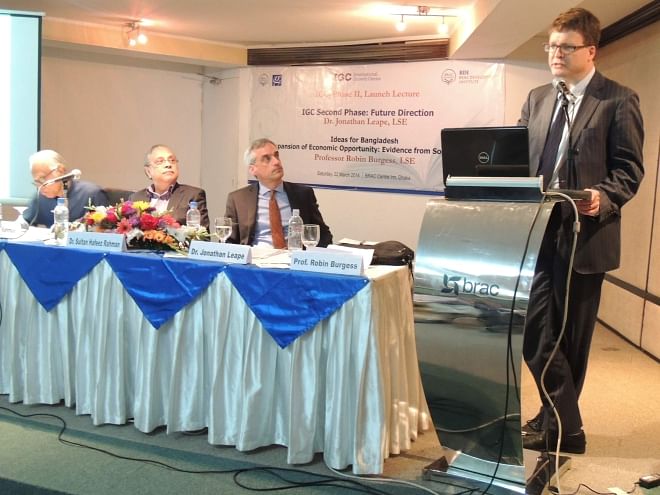Build effective cities for sustained growth
Build effective cities for sustained growth
London-based economist speaks on urbanisation and economic prospects

Bangladesh will not be able to generate sustained economic growth if rapid urbanisation fails to build effective cities for higher productivity, an expert said yesterday.
Robin Burgess, a director of International Growth Centre (IGC), a London-based research institute that provides advice on economic growth, said firms in cities of developing countries like Bangladesh tend to remain unproductive.
“There is thus a large untapped potential for growth that is not being realised,” he said, while speaking at a public lecture at Brac Inn in the city.
IGC, the Institute of Governance Studies and Brac Development Institute organised the lecture on the country's economic prospects.
Prof Wahiduddin Mahmud, a member of United Nations Committee for Development Policy, said the country has no other alternative but to go for urbanisation and industrialisation to become a middle-income nation.
“It seems that we will have to urbanise the whole country, while keeping land for agriculture.”
He said Bangladesh cannot tap its growth prospects by relying on low productive industries, exports of low-skilled workers and low-value items, while calling for productivity to be raised in all areas.
While eliminating poverty is difficult, eradicating extreme poverty is not, and it is within Bangladesh's means, said the former caretaker government adviser.
Burgess said the cities in Bangladesh would have to compete with each other to woo investment, just like cities in China once did.
He said structural change at the bottom, improvements in state capacity, industrial development, more rapid urbanisation and better access to energy could lead to higher growth for Bangladesh.
“A large swathe of people is trapped in unproductive, risky occupations such as landless agricultural workers in Bangladesh—we have to see how we can promote structural change amongst them.”
Also a professor of economics at the London School of Economics, Burgess said the country would have to put in place a mechanism such that the citizens would pay taxes to fund activities of the state, as taxation and development is highly correlated.
The economist said bureaucracy must be made effective and political leaders refrained from taking decisions which go against the citizens' interests.
He went on to call for city governance systems which contain incentives for politicians and bureaucrats to provide services and make them accountable for doing so.
Burgess described Bangladesh as an unsung hero of development thanks to the country's remarkable achievement in social and economic sectors.
The country has the capacity to generate new ideas that have international resonance, as success stories like Brac is being replicated around the world.
“Industrial revolution in Bangladesh has not finished and industrial development will be a key to faster growth. Getting industrial policy right will be a main factor to speeding up efforts to become a middle income nation.”
However, the country also needs to think about costs of growth, as pollution and global warming also extremely relevant for Bangladesh, he added.
Jonathan Leape, executive director of IGC, said Bangladesh has set out a pro-poor growth in the last three decades which have become a model for other countries. “We will have to build on the progress,” he said.
The LSE professor went on to call for deeper collaboration between policymakers and researchers to address challenges posing threats to growth prospects.
Leape also said Bangladesh would have to raise tax-GDP ratio to 20 percent from 11 percent now to achieve higher economic growth.
Sultan Hafeez Rahman, director of IGC Bangladesh Research Progra-mme, who chaired the programme, said the country would have to go for industrialisation, upgrade skills and become more productive.